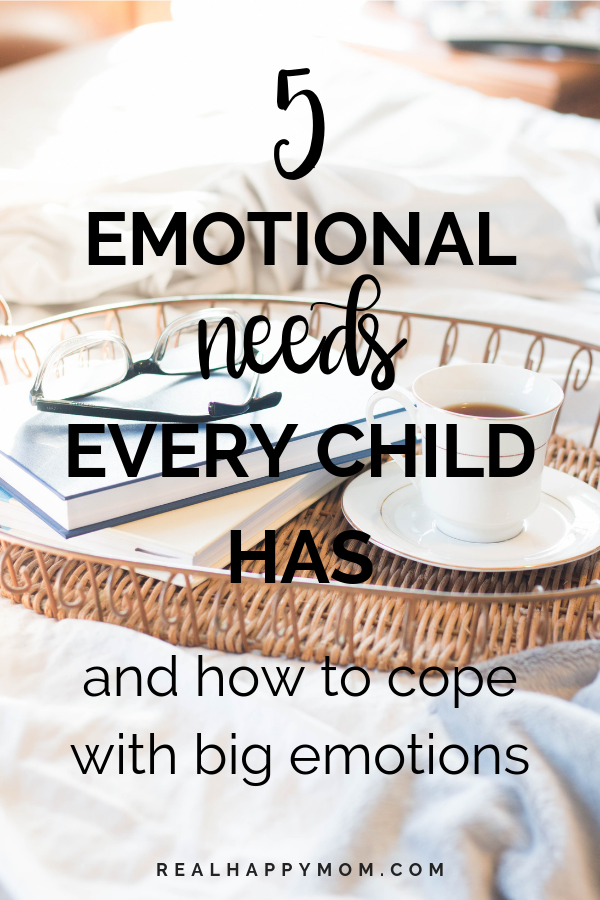Do you ever wonder about how to cope with big emotions with your little one? Or how to make sure that you are providing for your child’s emotional needs?
You’re in the right place. I got Leigh to help me with on Real Happy Mom Podcast to learn how to cope with big emotions.
But first, it starts with understanding the emotional needs of a child.
About Leigh
Leigh is a social worker in South Africa. She is also a wife to a yummy husband and mother to two little girls.
Having worked as an adoption social worker, Leigh has worked with many families over the years.
While working as a social worker, Leigh developed and completed child assessments. This allowed Leigh to really understand the emotional needs of a child.
5 emotional needs of a child
And the nice thing with these five points is it’s what I discuss with parents. But, I often find that it’s quite an aha moment for parents. In that we’re often quite anxious as parents. And once we go through them, people often realize that they doing it anyway and they don’t realize it.
Before jumping into these 5 emotional needs know that you are probably giving your child these needs. So don’t be so hard on yourself.
Need for security
Of course, we want to keep our children as safe as parents.
When Leigh mentions security she isn’t necessarily talking about keeping your child physically safe.
Leigh explains that a child feels secure when they have consistent and reliable relationships.
So they need to know that they can rely on their parents. And it would be predictable so that the relationships, first of all, we’re not dealing with mom who sometimes screams and shouts and sometimes loves and hugs. You know? Where am I standing with mom at the moment? That doesn’t make children feel safe.
Need for recognition
It’s important for moms and parents to recognize their children and not recognize them just as being there, but recognizing them as active members of your family.
Leigh suggests making the child feel like they are an active part of the family.
By being an active part of the family it means letting them have a say so in some of the family decisions regardless of their age.
For instance, you can ask your little one what they would like the family to do for fun for the weekend.
One of my favorites is letting my little guy decide what dessert to make as a treat for everyone.
For example. Have family meetings and sit down and allow your children to be part of family decisions because that gives them that sense of recognition.
This also helps your child build positive self-esteem.

Need for responsibility
I totally get it. It is so much easier to do things yourself. But doing everything for your child doesn’t allow them to have responsibility.
It may be challenging, but let go and allow your child to clean up the mess they made or help with making their own breakfast.
Chores are important, because it teaches your child responsibility and that everyone has a role to play in the home.
Need for new experiences
It’s really important that children learn about the world by seeing the world. They learn about life by experiencing life.
This includes getting out and trying new things.
Need for love
This one may seem like a no brainer. But kids receive and show love in different ways. It is important to understand your child’s love language.
There is nothing worse than showing your child love with gifts when the really seek physical touch, like hugs and kisses.
So there are the 5 emotional needs every child has.
More than likely you have probably found that you provide all of these needs for your child. Now it is just refining them and doing it better.

How to cope with your child’s big emotions
After working with many families and children, Leigh has lots of experience dealing with toddler’s big emotions.
The most important thing when it comes to helping your toddler deal with a big emotions is to allow them to feel those emotions. Often parent parenting is tiring. It’s exhausting.
So many times as parents we brush things off because we are tired. I get it.
How many times have you heard or said something like this:
- A child is crying and the parent says “stop crying” or “stop crying before I give you something to cry about”
- It’s the middle of the night and your child comes to your bed saying “I’m scared” and you reply back “Oh, just go to bed.”
- A child is frustrated with a toy and the parent says “be quiet” without investigating or asking what is frustrating them.
Allow them to feel and validate the emotions
The best thing that you can do for your child is to allow them to feel these big emotions. Also, validate your child’s feeling instead of brushing them off.
Leigh suggests getting on your child’s level and explaining to them that you know how they feel. Then help them to manage their emotions properly.
Acknowledge your feelings as well
One thing that I have found is that it takes a lot of patience to really manage these emotions.
But sometimes you’re over it. And you’ve had enough of the crying.
The key to a successful family is talking openly about your feelings. So yes, you get frustrated and you have to have patience to deal with, but sometimes you don’t. And sometimes you do. You do say just keep quiet. I can’t deal with it anymore. But to be able to then after that, go to your child whenever you feeling better and say: ‘You know, see mommy gets frustrated sometimes and when we get frustrated we shout and, and scream at people and it’s not nice. So Mommy is sorry.’
It is so important to acknowledge your emotions as well. Then your family is able to speak openly about their feelings.
Not just good feelings, but the bad ones as well.
Once I remember my son getting very frustrated and angry with his toys and my husband told him not to be angry.
Immediately I spoke up and said that it is okay to be angry, but it’s not okay to be angry and start throwing your toys.
So next time instead of telling him not to be angry, ask what is making your little one angry so that he can talk about what is irritating him.

Teach tools to use to cope with emotions
Leigh suggests teaching your child tools to use to cope with their emotions. This can be done by having trigger words to remind them to cool down before they explode with emotions.
Leigh used her daughter as an example. When her daughter gets angry or frustrated, Leigh reminds her of taking five deep breaths by saying “why don’t you go sing to yourself.”
When her daughter hears “sing to yourself,” she knows that she needs to stop and take five deep breaths. This allows her to calm down and handle situations better.
Resources to help with big emotions
Leigh suggests learning your child’s needs and temperament so that you can be more in sync with your child.
Meaning, I know that for example, you know your baby when you’ve got a newborn baby. You know at four o’clock you’re not out at a friend’s house because they’d been awake all day and they’re cranky. You start getting to know each other. And I think if we can understand our children and where they are as toddlers or older children, I think makes our job a little bit easier.
This is the foundation for an upcoming course that Leigh is creating.
You know, people always say there’s no manual to raising kids, but I think there’s been enough people and enough developmental psychologists who’ve done all the hard work and years and years and dedicated their lives to research. And I think that’s for a reason. I think that also needs to be put out into the world and parents need that.
Leigh also suggests using any games that teach your child about emotions.
Or help them to recognize different emotions.
Even if it is sitting down and looking at a book and describing the feelings of the different characters, have your child identify the feelings and talk about it.
So can you talk about what’s happening in the picture. How’s that? How’s the one person feeling? How’s the other person’s feeling? What are they saying to each other? Just get your children to talk about feelings.

Leigh’s final words on how to cope with big emotions
To all the Moms, I think you’re doing a great job and you’re doing a lot better than you think you’re doing. And keep moving. And keep parenting. And your children will grow up into well-adjusted adults one day.

To learn more about Leigh, head over to her website. You can also check her out on Twitter, Instagram and on Facebook.

Key takeaways:
- The 5 emotional needs of a child are a need for security, recognition, responsibility, new experiences and love.
- Allow your child to feel their big emotions and validated them. This is one way how to cope with big emotions.
- Acknowledge your feelings as well
- Learn your child’s needs and temperament to better be in sync with your child.
- Use games to teach your child about emotions.
Links mentioned in this episode:
- 2019 Planner
- Leigh Rebow website
- Leigh on Facebook
- Leight on Twitter
- Leigh on Instagram
- Facebook Live video series on the emotional needs of a child
Subscribe & Review in iTunes
Have you subscribed to the Real Happy Mom podcast? If not, I’m encouraging you to do it today.
I don’t want you to miss any upcoming episodes. I am planning on adding some bonus episodes that you won’t find on this website and if you’re not subscribed you might miss out on those. Click here to subscribe in iTunes!
I would be so happy and grateful if you left me a review on iTunes too. Reviews help iTunes to know that this is a podcast for other moms so that other moms can find this podcast. Plus, it really makes my day to read the reviews.
Just click here to review, select “Ratings and Reviews” and “Write a Review” and let me know what your favorite part of the podcast is. Thanks in advance!
Don’t have iTunes? You can subscribe to the podcast Google Podcast, Anchor, Spotify, Breaker, Castbox, Overcast, RadioPublic, and Stitcher.

[…] 5 Emotional Needs of a Child and How to Cope with Big Emotions […]